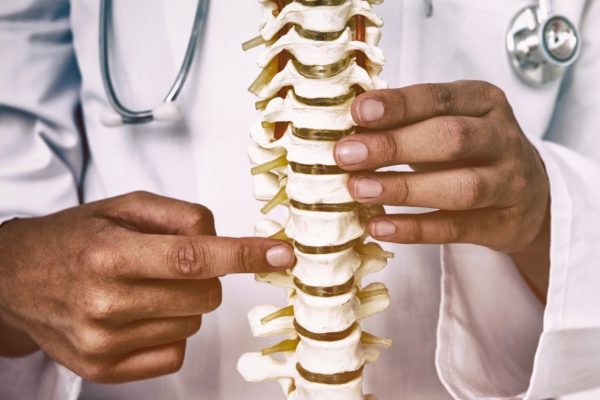Back Pain: Why A Surgeon Only Operates On 5-10% Of Patients

Back Pain: Why A Surgeon Only Operates On 5-10% Of Patients
Posted on Wed Nov 25, 2020
Mr Bob Chatterjee, Consultant Spinal Surgeon and upcoming speaker at Oryon Develop’s 10th Annual Spinal Symposium, discusses the need for surgery and why he only operates on 5-10% of his patients.
Back pain is a common complaint experienced by many patients and is one of the most regular ailments seen by general practitioners. GPs may prescribe anti-inflammatories and other pain medication, as well as encouraging gentle exercise, to alleviate the symptoms but if these fail and the pain continues, then patients will often be referred to an Expert Consultant Spinal Surgeon, such as Mr. Bob Chatterjee, who will fully investigate the problem.
However, despite Bob’s surgery-related title, his methods are almost entirely non-surgical. “For most people you have to make every effort to find a non-medicinal, long-lasting solution,” says Bob. “That can take many forms: cognitive, physiotherapy, chiropractic, osteopathic, sports medicine, acupuncture and more.”
Back pain
Back pain rarely leads to surgery. In most cases the pain will subside or disappear within 2 to 12 weeks with the assistance of anti-inflammatories, pain management and back care and therefore patients will not be referred to consultant spinal surgeons. Some GPs refer their patients to chiropractors, physiotherapists or osteopaths and other health professionals before referring them to a spinal surgeon.
‘I tell my students: “Never take your patients to the theatre; let them take you.’
Patients will obviously be anxious and worried about the pain they’re experiencing if they don’t know what’s causing it.
Bob says, “what people need is an understanding of where their pain is coming from. It’s very empowering; if you understand why your back or your neck is the way it is, then it takes away a lot of the associated anxiety, because often when you get pain you don’t know what it represents: is something badly wrong, are you making it worse, can you exercise etc. All these things are linked, and I often find that if I can do a bit of diagnostic work and find the cause of the problem, the anxiety goes away and that can often be all that’s necessary.”
Conservative management
Surgeons look at conservative care before resorting to surgery, beginning with carefully listening to the patient’s story of when and possibly how the pain first manifested itself. Bob has always maintained that “the first thing to do is to thoroughly investigate. Although I order lots of tests and do my own thorough clinical examinations, the most important part is simply listening to the patient. So the first thing to do before entertaining any thought of surgery is to understand why they have their back pain.”

More often than not, conservative management of back pain is the solution to a patient’s problems. There are many avenues that can be explored. Bob states that “for most people you have to make every effort to find a non-medicinal, long-lasting solution. That can take many forms: cognitive, physiotherapy, chiropractic, osteopathic, sports medicine, acupuncture and more.”
Conservative care includes simple things like gentle stretching and strengthening exercises, adjusting posture and staying physically active when not in pain. Bob notes that “the body is actually a very resilient mechanism when it comes to the spine. You don’t have to fix everything you see. You can often compensate by improving your bio-mechanics; your posture; the way you do things, and that will often get things better.
Surgery
There are very few cases where immediate surgery is needed. Unless the patient has a tumour or fracture, there’s plenty of time to fully investigate before deciding on surgery and, as Bob explains, “generally speaking, unless they have a tumour or a severe fracture, surgery is the last thing you do.” As Bob says, “it’s a process of doing your detective work first, and then only if conservative measures fail then surgery becomes an option. I only operate on somewhere between 5 and 10% of all my patients.”
Studies have shown that patients with a positive and informed outlook on their health will have a shorter and more successful recovery rate.
The decision to have surgery should be an informed decision made by the patient. Bob tells his students: “Never take your patients to the theatre; let them take you.” Patients ought to have exhausted all the options and to have made a positive decision about surgery being the right thing for them.”
If a patient is able to manage their pain and go about their daily life as usual, then a non-surgical path should be chosen. If back pain is causing sleep disruption and an inability to continue life as normal following robust efforts to alleviate symptoms, then surgery may be the only option for the patient to have quality of life.
Understanding and knowing your patient and gaining their trust is exceptionally important with any surgery. A patient who firmly believes that a spinal surgeon is genuinely concerned for their wellbeing will not only trust any prognosis given but will also feel confidence in the end result. Bob knows that “surgery isn’t purely scientific; there’s an element of psychology as well. You’ve got to get to know your patient and vice versa; there needs to be a bond of trust and you need to agree on what’s being done.”
Should surgery be the only route to alleviating back pain, then it’s important that the patient’s mental health is considered. Understanding a patient’s mental outlook can greatly assist the consultant spinal surgeon in deciding on relevant post-operative care. Studies have shown that patients with a positive and informed outlook on their health will have a shorter and more successful recovery rate.
A final word from Bob, “In my practice surgery only comes into consideration if conservative measures have failed.”
About Bob Chatterjee
Mr Bob Chatterjee MBBS MRCS MSc(Dist) FRCS(Tr&Orth) is an Expert Consultant Spinal Surgeon practising in Central London.
Bob is a speaker at Oryon Develop, who put on healthcare CPD courses. To see our latest courses please click here. Bob is both the Director of Harley Street Spine and the Director of the Spinal Unit at St John and Elizabeth Hospital. He also practices at The London Clinic.
Share this article
Most Recent
All you need to know about getting a private chest X-ray
Posted on Thu Feb 22, 2024
Posted on Wed Jan 17, 2024
Posted on Mon Dec 18, 2023
Stay up to date
If you’re interested in keeping up with what we’re doing, just leave your email address here and we’ll send you periodic newsletters and other updates.





